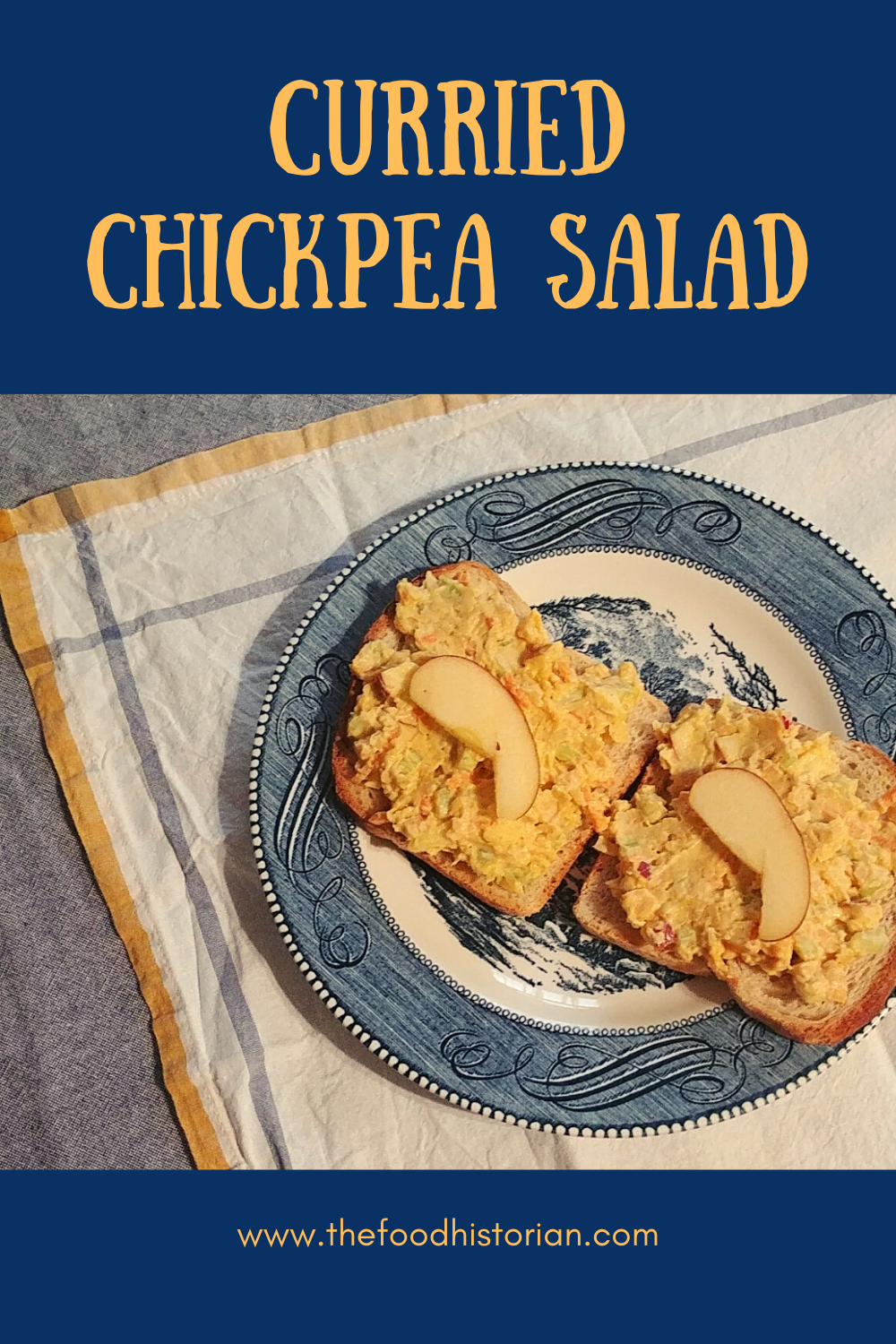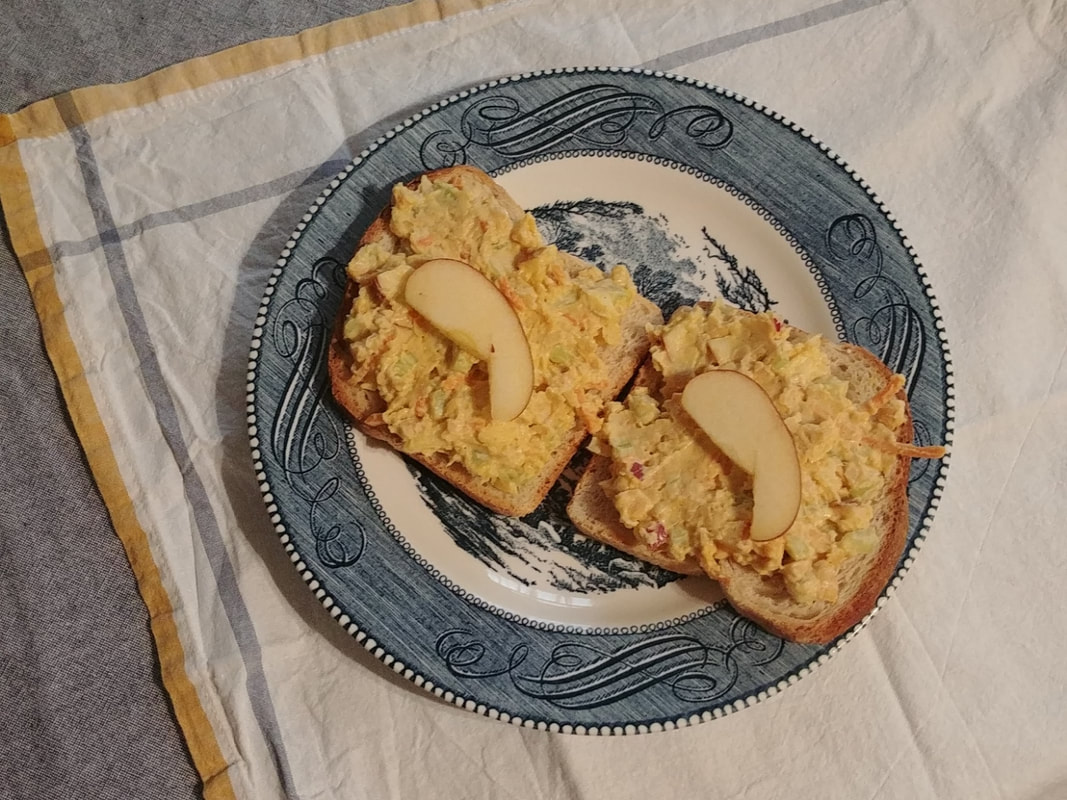|
I made curried chickpea salad last week, and it was so delicious, I thought I would share it for Meatless Monday. Although it is not a historic recipe, clearly it's a riff on curried chicken salad, which had its heyday in the mid-20th century, although you still see it on restaurant menus, especially tea rooms and bakeries and small cafes. It's not super clear when precisely curried chicken salad was invented, but there are lots of references throughout 19th century American cookbooks to all sorts of curried dishes - eggs, oysters, veal, cucumbers, shrimp, okra, and yes, chicken, although not in a salad until the 20th century. Country Captain is one of the first curry dishes in the United States, and may have inspired curried chicken salad in the 20th century. Made with browned chicken, onions, curry powder, tomatoes or tomato sauce, and golden raisins or currants, it was meant to be served over rice and likely originated in the Carolinas, where rice cultivation (fueled by slave labor) was common. It is called "country captain" because it was apocryphally introduced via a sea captain returning from India and/or involved in the spice trade. This savory, sweet, and mildly spicy flavor combination has been deemed by some historians to be the first fusion food in U.S. history. But it is unclear where curried chicken salad as made in the United States draws its roots. It may very well be from the flavor profile of Country Captain, and mayonnaise-based salads were exceedingly common by the turn of the 20th century. Some enterprising soul may have come up with the idea independently. However, in 1935, King George V of Britain celebrated his silver jubilee, and although I cannot find an original menu from the event, everyone swears a cold chicken dish with curried mayonnaise was part of the dinner (which some people thought was an unnecessary extravagance during the Great Depression). The dish was recycled (perhaps inadvertently) for Queen Elizabeth's coronation in 1953, this time with some fancier additions of tomato, pureed apricot, red wine, and whipping cream (try the original recipe). Jubilee chicken and coronation chicken, as the recipes have come to be known, are still quite popular in Britain, although they rarely show up on American shores under that name. At the same time, prior to Queen Elizabeth's coronation, we do have recipes in the United States calling simply for cooked diced chicken, mayonnaise, curry powder, and diced celery (like this one). Basically, plain jane chicken salad with some curry powder thrown in for flavor. This 1930 cookbook has a recipe for chicken salad with grapes or raisins, and a recipe for curry salad dressing (curry powder, vinegar, and mayonnaise), but the two aren't put together. So again, the official origins are unclear. But suffice to say, a curried chicken salad with celery and some variation of either golden raisins, currants, diced apple, and/or grapes has become an alternative to the more traditional (and boring) basic chicken salad. I chose to replace the chicken with canned chickpeas in part because poaching chicken is a drag and I hate the canned stuff. But also because not only are canned chickpeas easier and more accessible than poached chicken, they're a little healthier for the gut, too. Vegetarians and vegans often use chickpeas as a substitute for chicken or tuna. It turned out even better than I remembered from the last time I made it, and it seems appropriately vintage, even if it isn't actually historic. Curried Chickpea SaladA quick weeknight supper perfect for when it's too hot to cook, but equally at home at a tea party. To make this vegan, substitute all vegan mayonnaise for the yogurt and mayo. 2 cans (16 oz.) chickpeas, or 3 cups cooked from dried 3 ribs celery, minced 1/2 cup shredded carrots (I use the bagged kind) 1 small, sweet, crisp apple, minced 1/2 cup Greek yogurt 1/2 to 1 cup mayonnaise 1/2 to 1 tablespoon high quality curry powder salt & pepper to taste Drain and rinse the chickpeas, then mash roughly with a fork. I don't like any whole chickpeas in mine, but neither do I want a puree. Add the celery, carrots, and apple and mix well with a fork to combine. Add the yogurt and curry powder and mix, then add the 1/2 cup of mayo and mix. If too dry, add more mayo. Taste and add more curry powder, salt, and pepper if necessary. The warm spices of the curry powder set off the creaminess of the mayo and yogurt and the sweetness of the apple nicely, and the celery and carrots add crunch and texture. I like mine served open-faced on whole grain toast. The hubby prefers his sandwich closed on untoasted bread. You can also eat it with crackers, in a wrap, or frankly, with a spoon. If you want to try something more country captain style, add golden raisins and a little tomato paste. For something more coronation-style, try diced dried apricots or a few tablespoons of mango chutney. Add lemon or lime juice for tang, or leave it out. But whatever you do, don't use that little jar of curry powder that's been in the back of your spice cabinet for years. Get yourself a new jar or better yet, go to a store with a bulk spices section and get some fresh stuff that way. Have you ever had curried chicken salad? Or chickpea salad? Tell us your favorite quick weeknight dishes in the comments! The Food Historian blog is supported by patrons on Patreon! Patrons help keep blog posts like this one free and available to the public. Join us for awesome members-only content like free digitized cookbooks from my personal collection, e-newsletter, and even snail mail from time to time! Join by June 30, 2020 and get a picnic history packet mailed to your door!
2 Comments
5/24/2021 04:31:50 pm
Thanks for this helpful post. Chick peas are my new 'go to'. So healthy and tasty. I tend to buy the cans now because they are not so expensive and worth the time saving associated with soaking. I always drain (mostly) and cook them down -- really prefer mushy. I've been making my own brand of hummus, / salad, substituting the tahini or yogurt with ricotta cheese. Fresh curry a must. I use za'atar too.
Reply
5/26/2021 09:20:06 pm
Thanks, Jacquelyn! I also prefer my chickpeas extra-soft. Sometimes they can be a little chalky right out of the can. I am not a huge fan of tahini, so I love the idea of subbing yogurt or ricotta in hummus! I'll have to give that a try.
Reply
Your comment will be posted after it is approved.
Leave a Reply. |
AuthorSarah Wassberg Johnson has an MA in Public History from the University at Albany and studies early 20th century food history. Archives
July 2024
Categories
All
|



 RSS Feed
RSS Feed